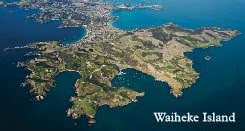The petition/application to the Local Government Commissions to move the Hauraki Gulf Islands to Thames-Coromandel District Council (TCDC) was personally lodged with the four affected councils, starting on Friday the 26th of September 2008 with the original to TCDC, followed by copies to the Auckland Regional Council (ARC) and Auckland City Council (ACC) in the morning of the following Monday, and Environment Waikato Regional Council (EW) in the afternoon.
Also in the morning it was delivered to Independent Election Services with a covering letter from Thames-Coromandel's CEO, Steve Ruru, asking that it be validated to make sure it had the necessary minimum number of signatures. In law it must be signed by 10% or more of registered affected electors.
That hurdle was easily passed on the first pass (counting the easy ones), so at 10.5% the count was stopped. The petition/application was now legal. That was announced by Independent Election Services on Friday the 3rd of October.
The chairman of ARC acknowleged the petition/application in a brief letter a few days later. EW did the same in a precisely-worded letter, perfectly sheeted home to Schedule 3 of the Local Government Act 2002, which is the governing legislation for the process that has now been set in train. TCDC had of course acknowledged it personally on Friday the 26th, and with the covering letter from Steve Ruru.
In law the four councils had to decide if the Reorganisation Scheme based on the Reorganisation Proposal will be developed by a joint committee or if one council will be nominated to do it. If they cannot agree within 60 days, in this case by the 25th of November, the application must go straight to the LGC.
Auckland Regional Council, Environment Waikato Regional Council and Thames-Coromandel District Council have now all voted to send it straight to the LGC, so it no longer matters what Auckland City Council wants. It never said a word about it at its last meeting on the 24th of October, but now whether it agrees or disagrees the result is the same--it has to go straight to the LGC. That means the councils have also given up any right to stop the application further down the track. It also shortens the process somewhat.
The next phase is submissions to the LGC from interested parties, a phase which lasts two months once it begins, then the LGC makes its ruling. That will be sometime early next year.
Submissions must be grounded in the points of law that the LGC's decision must be made on. They cannot just be 'I agree' or 'I disagree', 'It's brilliant' or 'It's looney.' Submitters have to offer evidence or proof to support their contention that under one of those points the application should be granted or denied.
skip to main |
skip to sidebar

Waiheke from the west (the end nearest Auckland)

I live on Waiheke Island, a jewel set in New Zealand's Hauraki Gulf. I am a former member of the Waiheke Community Board, which was rebadged as the Waiheke Local Board in the SuperSilly reorganisation of 2010.
For my over-the-top humorous(?) blog, in which The Fellow Passenger hurls scorn at untoward shennanigans on
Waiheke
and associated untowardishness elsewhere, click on this link: The Lower Deck.
Featured post
ROCKY BAY NEVER WAS OMIHA
A Waiheke Island Myth Part 1 On Waiheke Island, New Zealand, a myth has grown up among a handful of people in the Rocky Bay Village th...
Waiheke Island, New Zealand

Waiheke from the west (the end nearest Auckland)
Search This Blog
Total Pageviews
NOTE ON PAGEVIEWS
Blogger has only been counting views since mid 2009, not from the start of this blog.
Followers
My other Waiheke blog
About Me

- Nobilangelo
- My Christian name is pronounced 'noble-arn-jillo' (i.e., both o's are long, so the first two syllables rhyme with 'noble' not 'hobble'--yes, I know that's obvious, because there's only one 'b' between the 'o' and the 'i', but some people seem to see two b's, hence the English lesson). My surname is pronounced kerra-marliss. I was born, bred and educated in New Zealand, except for an international systems-engineer's course in San Antonio, Texas. I am born-again Christian, a thinker with a very practical turn of mind, a scientist with a particular interest in planet-friendly energy and neuroscience, an engineer (mechanical, industrial and IT systems), an inventor, a Member of the American Association for the Advancement of Science, a writer and poet, a naturist, a designer in different fields, an arranger and composer of symphonic music, a multi-award-winning IT journalist, a photographer, and a practitioner at various times in other hands-on fields including building, metalwork, woodwork, stained-glass and landscaping.